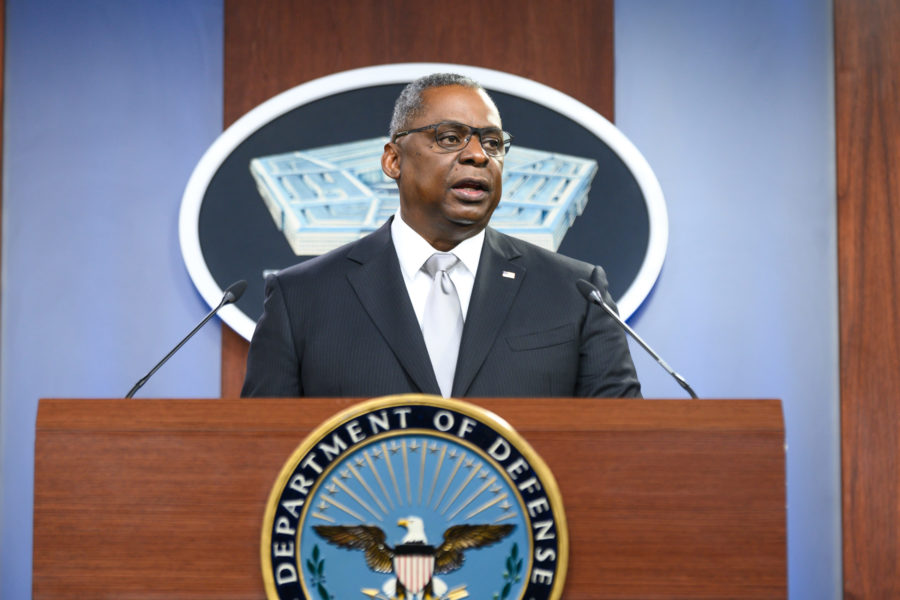The Defense Department may change its policies to hold leaders accountable when military strikes go awry and innocent civilians are killed, said Defense Secretary Lloyd J. Austin III on Nov. 17. During a rare press briefing by Austin at the Pentagon, he also questioned Putin’s actions on Ukraine’s border, but when asked, he did not explain why deterrence has failed to quell Iran’s malign activities or say why China is further along in the development of hypersonic weapons than America.
“The American people deserve to know that we take this issue very seriously and that we are committed to protecting civilians and getting this right,” Austin said, referring to an Aug. 29 airstrike in Kabul that killed 10 civilians, including seven children.
“We have more work to do in that regard, clearly, and I recognize that,” Austin added.
The target in the strike was thought to be an ISIS-K operative but was revealed to be an aid worker and his family. An investigation found that confirmation bias and poor communication caused the error, which took place just three days after 13 American service members were killed by an ISIS-K attack during the noncombatant evacuation operation at Hamid Karzai International Airport.
In a 2019 strike against ISIS in Baghuz, Syria, brought to light by the New York Times, dozens of civilians were killed along with 16 fighters before U.S. Central Command allegedly covered up wrongdoing and disallowed an investigation of war crimes.
The report claims the strike was conducted by a Special Operations unit called Task Force 9. U.S. Special Operations Command spokesperson Col. Curtis J. Kellogg told Air Force magazine, “allegations of a cover-up are inaccurate based on the facts U.S. Central Command provided.”
Nonetheless, Austin committed to change U.S. policies once two independent studies are available. He also said he is now reading recommendations that he requested from the commanders of SOCOM and CENTCOM following the Kabul strike.
“We must work harder. I’m committed to adjusting our policies and our procedures to make sure that we improve,” he said.
Asked if he would impose disciplinary action or otherwise hold people accountable, Austin said: “I believe that leaders in this department should be held to account for high standards of conduct and leadership.”
Austin said the department will shortly review two outside studies on civilian harm, one conducted by the RAND Corp. as part of the National Defense Authorization Act of 2020, which will be released soon; another, on civilian casualties in Syria, which is in security review.
Russia, Iran, and China
Austin, who is slated to meet with his Ukrainian counterpart at the Pentagon on Nov. 18, said it is still unclear why Russian President Vladimir Putin is massing troops on the Ukrainian border.
“We’re not sure exactly what Mr. Putin is up to,” Austin said, noting that he is in frequent contact with the head of U.S. European Command, USAF Gen. Tod D. Wolters.
“These movements certainly have our attention. And, you know, I would urge Russia to be more transparent about what they’re up to, and to take steps to live up to the Minsk agreements,” Austin said, referring to the 2014 agreement that reduced conflict between Russia and Ukraine in that country’s southeast Donbas region.
Security analysts are worried Russia may be massing troops again with the intent of another land grab after Russia annexed the Crimean Peninsula in 2014, leading to international sanctions.
Iran’s malign activities in the Middle East were also discussed, as the Secretary was asked to clarify why the USS Essex did not fire on an Iranian naval helicopter Nov. 13 that circled three times and came within 25 yards in the Gulf of Oman.
“We are prepared to defend our interests and our partners going forward,” Austin said. “We’re going to continue to work with our allies and partners to ensure that we communicate to Iran that this type of behavior won’t be tolerated again.”
Separately, the Secretary said DOD is committed to preventing Iran from obtaining a nuclear weapon and that the Pentagon supports diplomatic efforts for Iran to rejoin the Joint Comprehensive Plan of Action, the so-called “Iran nuclear deal” that President Donald J. Trump withdrew from in 2018.
Austin also repeated his refrain that China is America’s “pacing challenge” in the wake of China’s alleged orbital hypersonic weapon test in August.
“We also have to maintain the capabilities to defend ourselves,” Austin said. “We’re working as hard as we can to ensure that we can defend ourselves against a range of threats going forward.”
However, Austin could not say why China appears to have fielded a hypersonic weapon before the United States.
“We continue to move as fast as we can to develop capabilities. And again, we look at our full range of capabilities, and not just one specific capability, as we look at our adversaries,” he said.
